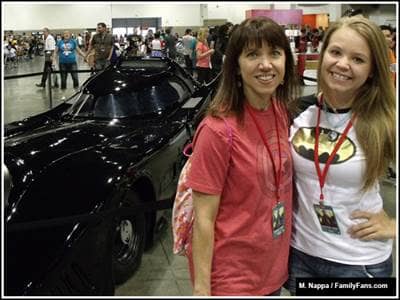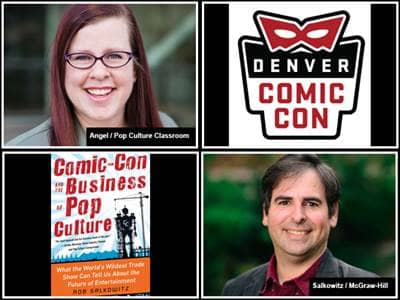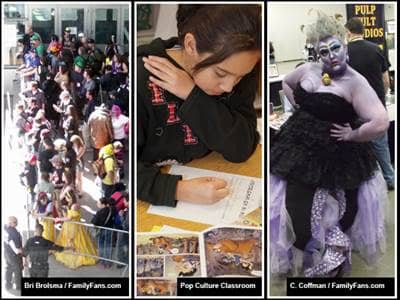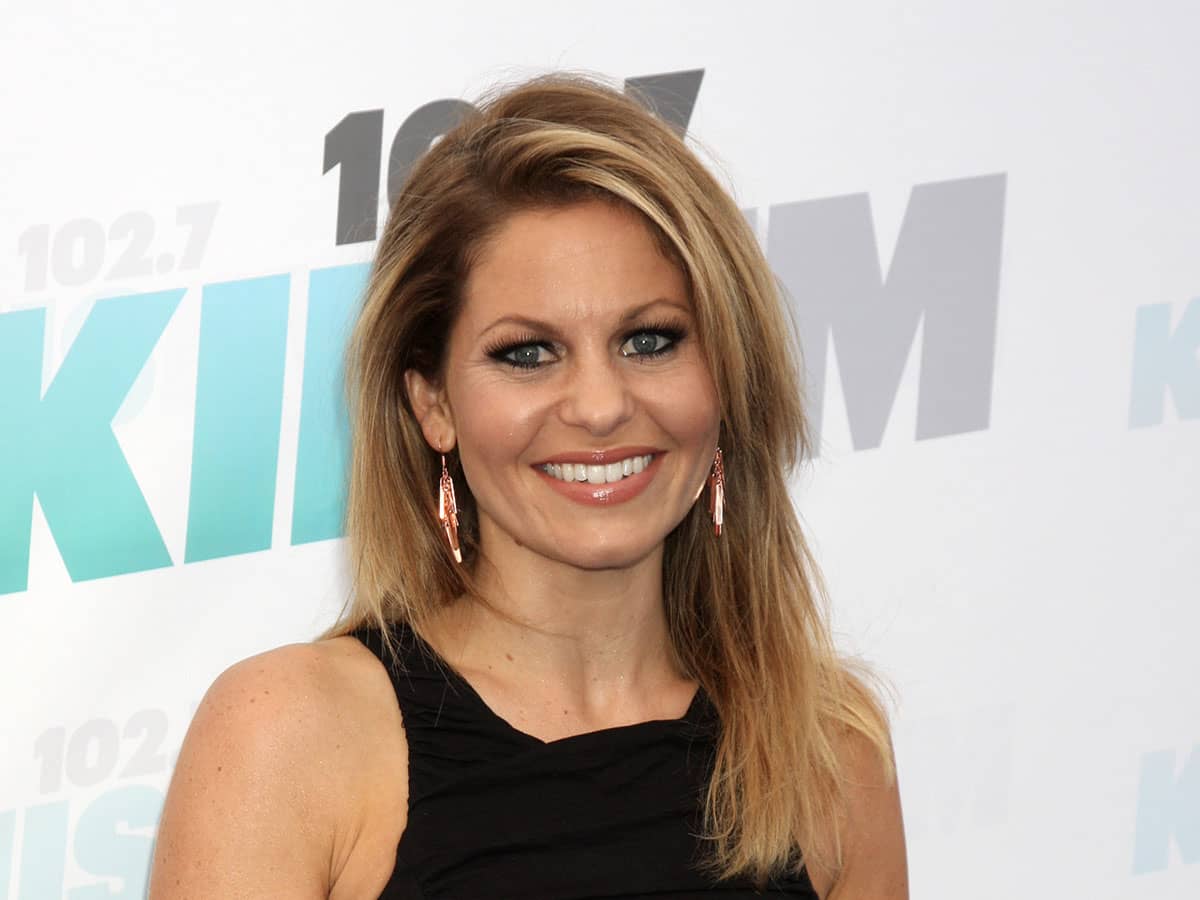
No, it’s not just that Darth Vader is digging through the sales at the “Tower of T-Shirts” booth. (The Sith Lord wears a black-metal chest plate—what’s he going to do with a “Keep Calm and Use the Force” tee?). And it’s not the life-sized LEGO Batman walking around, or even the improbably sweet scene of The Joker having a picnic-style lunch with his four adorable preschoolers. Here’s what’s really odd:
Comic Con is filled with girls.
There are women everywhere—most in their teens and twenties. They’re taking pictures next to the Batmobile. Posing for photos in Wonder Woman and Ursula the Sea Witch costumes. Standing in line for panel discussions on Captain America and the History of Censorship in American Comic Books. They’re digging through comic book bins. Asking for—and signing—autographs on comics. Buying T-shirts with Wookies on them, and generally enjoying the brash displays of nerd culture that surround them.
What gives?
The Times, They Are A-Changin’
Twenty-five years ago—or even five years ago—the idea that women would be found en masse at any comics-themed location was laughable. In fact, The Big Bang Theory TV show has made big money off that stereotype. Today, though, everything’s changed.
“The eyes don’t lie,” says Marvel Comics editor-in-chief, Axel Alonso. “If you go to conventions and comic book stores, more and more female readers are emerging. They are starved for content and looking for content they can relate to.”
The numbers don’t lie either, says Rob Salkowitz, noted trends analyst and author of Comic-Con and the Business of Pop Culture.
“I just did some research on behalf of Eventbrite, the online ticketing company,” he reports. “We found that the current audience for fan conventions (comics, gaming, anime and specialty fandoms) is about 45% female/55% male. BUT – if you look at numbers for age 30 and under, it’s almost exactly 50/50. Facebook research [also] shows millions of women are fans of comic and pop culture properties, approaching parity with men.”
As Neo from The Matrix would say: “Whoa.”
Why Are Girls Suddenly Into Comics?
Dr. Christina Angel is an English Literature professor—and convention director for Denver Comic Con. She sees in people what Salkowitz sees in numbers.

People under 30 seem to be driving this change—something that’s evidenced by the fact that over half (55%) of Comic Con-goers are 29 or younger. “The Millennial generation has really pioneered and validated a new nerd identity that’s not gender-specific,” Salkowitz observes. “This is just one of the many ways their attitudes are transforming some of the old 20th century assumptions about the culture.”
Dr. Angel also points to the muscle of movies and television. “Much of this is because of shows like The Big Bang Theory,” she says, “but also the marketing juggernaut that is Marvel Studios…It’s bringing people into the fold who have never been here before.”
Alonso sees a purer motive, one that transcends gender differences. “Marvel tells stories about human perseverance,” he says, “about super-powered individuals who rise to impossible challenges. Our readers aren’t rooting for the powers or the costume—they’re rooting for the person inside the tights.”
Salkowitz agrees. “The bottom line,” he says, “is that girls love the material as much as, or maybe more than, guys, and have formed strong communities online and off to express their fan interest.”
So…What About That Pesky Misogyny Thing?
One big obstacle to female fandom has always been the perception of misogyny in the portrayal of women in comics—something that persists today. For instance, an erotically-charged cover of Spider-Woman #1 in 2014 prompted outcry, and an eventual apology from Marvel Comics. “We apologize—I apologize—for the mixed messaging that this variant caused,” Axel Alonso said in a statement, adding, “We’re far from perfect, but we’re trying.”
Image Comics co-founder, Erik Larsen, also sparked controversy as recently as March 2015 by saying (among other things), “I’m tired of the big two [Marvel and DC Comics] placating a vocal minority at the expense of the rest of the paying audience by making more practical women outfits.” Larsen, it seems, prefers skimpy, sexy costumes on his female superheroes—something that didn’t sit well with noted female comics writer, Gail Simone. She responded sarcastically on Twitter: “Hey all you women who are now reading comics, quit being a vocal minority while dad is trying to sleep!”
Alonso makes no apology for his occasional apologies to the vocal minority, though. “With over 70-plus years of stories in the bank and counting,” he says, “Marvel Comics is modern mythology—and we’re well aware of the responsibility that comes with it. We take such great pains to portray our characters as the heroes they should be. Our protagonists are models for life.”
In this atmosphere Salkowitz observes, “These days more enlightened attitudes are starting to prevail. Female fans are becoming more vocal online in supporting the material they like and calling out the industry for disrespectful attitudes. Publishers, media companies and convention organizers have more at stake now than they used to because there’s so much money involved, so they need to be responsive to protect their brands as well as simply to do the right thing.” Dr. Angel also adds, “Certainly at Denver Comic Con we pride ourselves on being a safe space for everyone and take our anti-harassment and safe space policies very seriously.”
Can Christian Girls Be Fangirls?
In theory at least, the comic book industry’s desire to better respect and include women extends to religious fangirls as well. Still, the perception is that comic book culture often struggles to connect with religious readers because many popular comics either ridicule or antagonize the idea of belief. The bestselling DC Comics/Vertigo series, Preacher, is a prime example of this. Written by Garth Ennis, an atheist, this very popular, long-running comic story (soon to be adapted into a TV series) casts God as the ultimate villain, a Creator who abandoned his creation.
Other comics are not as openly antagonistic toward God, but it isn’t difficult to find comics and comics-based movies that treat God irreverently, or as irrelevant/impotent, or evil, or that propagandize moral views at odds with traditional religious belief, or which are insulting to Christians and their Christ. This makes it hard for fangirls with a religious background. They’re often attracted to comics, but feel as though they can’t relate to, and aren’t welcome in, the world of comic book culture.
Dr. Angel bristles at that perception, though. “Comics culture,” she says, “does not exclude anyone…Nerd culture is welcoming to people of nearly every walk of life and I think it’s quite easy to find plenty of places to fit in here no matter what your belief system might be.”
Rob Salkowitz agrees. He says, “In my experience, comic and pop culture fans generally don’t discriminate on the basis of faith or anything else: the only way to not fit in with a bunch of Doctor Who fans is if you don’t like Doctor Who; the only way to not be welcome among comic fans is to be unwelcoming and judgmental oneself.”
Where Do We Go from Here?
In spite of the unique the challenges associated with being a fangirl, comic book culture still offers attractive benefits for young women—not the least of which is a sense of community and goodwill.
“Comics and other kinds of fandom,” Salkowitz says, “are made up of people who get together out of common interest to celebrate their love of creative expression…Most of the things that divide American culture so deeply in the 21st century are almost entirely absent within fandom, so Cons are a great place to experience a sense of inclusive community that reflects the diversity of American society.”
And maybe that’s the real reason why young women are so into comics today: In that culture, girls have found a “village” where they finally feel like they belong.


